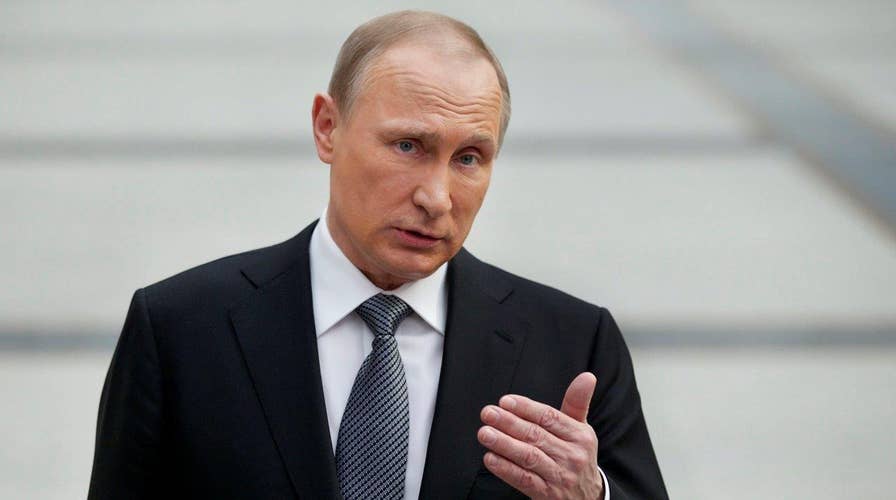Russian jet buzzes US Air Force plane over Baltic Sea
Defcon 3: James Jay Carafano of The Heritage Foundation analyzes threat posed by Putin
STUTTGART, Germany – Defense Secretary Ash Carter, in Germany to usher in a new U.S. military commander for Europe, used the opportunity Tuesday to send a blunt warning to Moscow not to provoke the NATO alliance – after recent encounters in the air and on the high seas.
"We do not seek to make Russia an enemy. But make no mistake – we will defend our allies, the rules-based international order, and the positive future it affords us," Carter said at the U.S. military's European Command in Stuttgart, Germany.
Carter expressed a desire not to start a new Cold War with Russia – or a "hot" one.
But he said Russia seeks to "erode" the peaceful order Europe and the rest of the West have enjoyed since the end of the Cold War.
Carter, in vowing the U.S. would defend its allies, warned Russia is increasing its submarine patrols to the North Atlantic. He did not specifically mention the recent "barrel rolls" by Russian jets over U.S. military aircraft in the past few weeks but accused Russia's leaders of "nuclear saber-rattling" and putting the world at risk in the process.
The Obama administration’s resolve to take on Russia remains a matter of dispute. President Obama was caught on an open microphone in 2012 assuring then-President Dmitry Medvedev he’d have more “flexibility” on the issue of missile defense after the election. Russia, under Vladimir Putin, later defied U.S. warnings with its takeover of Crimea and military involvement in Eastern Ukraine – and has complicated U.S. efforts in Syria with its intervention there.
Carter this week traveled to Germany for the installation of Gen. Curtis Scaparrotti at the helm of U.S. European Command. There are more than 60,000 U.S. soldiers stationed in Europe, significantly less than during the Cold War, when more than 200,000 soldiers were stationed mostly in Germany.
Carter said Tuesday the Pentagon has pledged $3.4 billion in next year's budget, quadruple the spending from last year, to beef up NATO's eastern flank with its allies. Carter said a new armored brigade would be heading to Europe, though officials told Fox News it would not arrive until the end of 2017.
Carter said the increase in funds would support an additional U.S. Air Force F-15 squadron, more U.S. special operations forces to train in Europe, and more submarine-hunting aircraft to counter increased Russian submarine activity.
"Russia’s aggressive actions only serve to further its isolation, and unite our alliance," he said.
Russia does not see it that way. Officials in Moscow believe the United States has violated a 1997 treaty that says NATO cannot amass forces along the border with Russia. The treaty does not specify how many forces are permissible.
En route to Germany on Monday, Carter told reporters the United States is considering putting more forces in Eastern Europe, but is waiting to consult with NATO officials before any final decisions are made. Carter said up to four battalions, or some 4,000 soldiers, could be added to Eastern Europe.
A handful of NATO defense officials will be on hand for a counter-Islamic State meeting Wednesday with Carter in Stuttgart.
Despite some tough talk about Russia, Carter indicated he’s willing to work together in the future: "We’ll keep the door open for Russia. But it’s up to the Kremlin to decide."
One example Carter used about past U.S.-Russian cooperation was Moscow's willingness to allow the United States and NATO to use a supply corridor in northern Afghanistan in the years following the 9/11 terrorist attacks and the start of combat operations against the Taliban and Al Qaeda.
That corridor has since been closed by Russia.
In his remarks, the outgoing U.S. commander of European Command, Gen. Philip Breedlove, a career fighter pilot, said his career is ending where it began, with Russia in his sights.
"My career started here in a Cold War trying to keep the peace. I think my career is now ending here trying to prevent a Cold War and continue to keep the peace," he said.
His replacement, Scaparrotti, was asked about Russian jets buzzing U.S. Navy ships and aircraft, when he was on Capitol Hill a few weeks ago before the Senate Armed Services Committee.
"Should we make an announcement to the Russians, that if they place the lives of our men and women on board Navy ships in danger, that we will take appropriate action?" committee Chairman John McCain, R-Ariz., asked.
"I believe that should be known, yes," Scaparrotti said.





